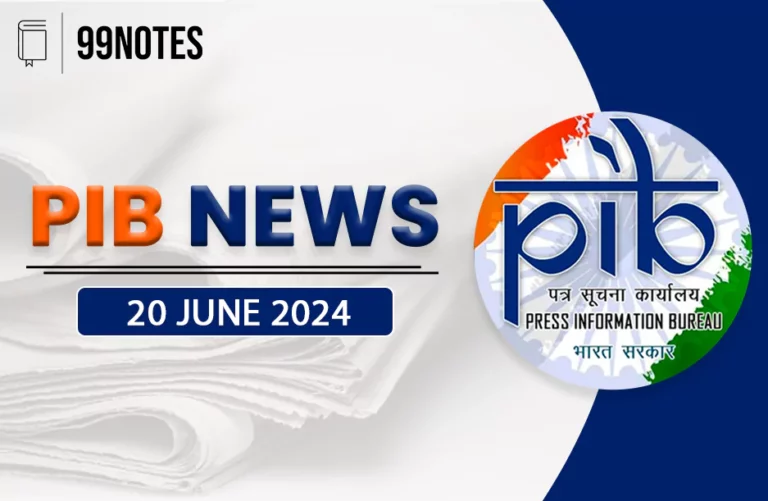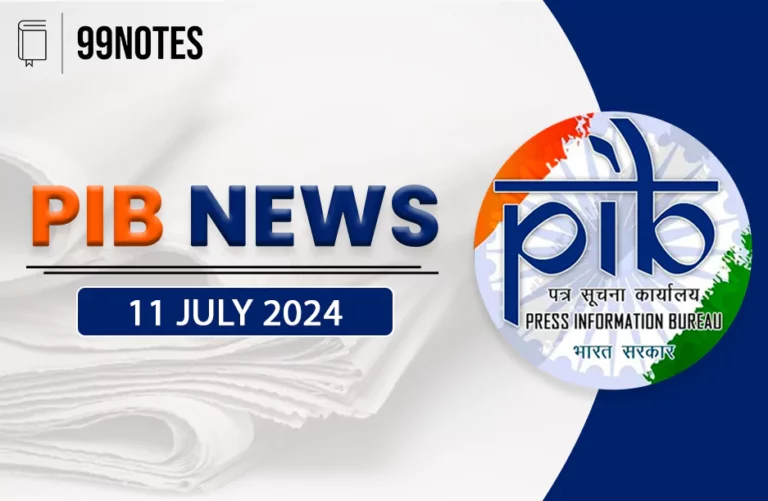20 July 2023 : PIB
PRESS INFORMATION BUREAU
20-July-2023
Daily Current Affairs For UPSC ,The PIB ( Press Information Bureau )
1. Minister of Cooperation Shri Amit Shah will inaugurate a ‘National Seminar on Delivery of CSC services through Primary Agricultural Credit Society (PACS)’
Topic: GS3 – agriculture sector.
Context:
- The Ministry of Cooperation, under the leadership of Prime Minister Shri Narendra Modi and guidance of Union Home Minister and Minister of Cooperation Shri Amit Shah, has taken initiatives to strengthen Primary Agricultural Credit Societies (PACS) throughout the country.
- The government aims to improve the viability of PACS, which are the backbone of cooperatives in the country, and benefit millions of farmers.
- PACS are being enabled to undertake more than 25 different economic activities, including dairy, fisheries, godowns, custom hiring centers, fair price shops, LPG/diesel/petrol distributorship, etc.
What are Primary Agricultural Credit Society (PACS):
Primary Agricultural Credit Society (PACS) is a type of cooperative credit institution that operates at the grassroots level in India. These societies are designed to meet the short-term and medium-term credit needs of farmers and promote agricultural activities in rural areas.
Key features of Primary Agricultural Credit Society (PACS) include:
- Cooperative Structure: PACS is a cooperative society registered under the Cooperative Societies Act of the respective state in which it operates. It is owned and managed by its members, who are typically farmers and rural residents.
- Focus on Agriculture: The primary objective of PACS is to provide credit facilities specifically for agricultural purposes. Farmers can access loans for various agricultural activities, including crop cultivation, purchase of seeds, fertilizers, and farm equipment.
- Financial Inclusion: PACS aims to promote financial inclusion in rural areas by extending credit facilities to farmers who may not have access to formal banking channels. It brings banking services closer to the rural population.
- Short-term and Medium-term Credit: PACS provides both short-term and medium-term credit to farmers. Short-term loans are typically for agricultural production needs, while medium-term loans are for activities like the purchase of livestock or farm machinery.
- Cooperative Principles: PACS operates based on cooperative principles, which include democratic decision-making, autonomy, and voluntary membership. Members share the benefits and responsibilities of the society.
Source: https://pib.gov.in/PressReleseDetail.aspx?PRID=1940740
2. The Ministry of Culture and the Indian Navy sign an MoU to revive the “ancient stitched shipbuilding method (Tankai method)”
Topic: GS1 – Indian art and culture.
Context:
- The Ministry of Culture and the Indian Navy have collaborated to revive the ancient ‘stitched shipbuilding method,’ a shipbuilding technique that dates back 2000 years.
- A Memorandum of Understanding (MoU) was signed between the Ministry of Culture and the Indian Navy to facilitate this remarkable initiative.
More information about Tankai method:
- The Tankai method is an ancient shipbuilding technique that originated in India. It is a stitched shipbuilding method, which means that the planks of the ship are stitched together rather than being nailed or riveted. This makes the ship lighter and more flexible, and it also allows for repairs to be made more easily.
- The Tankai method is thought to have been developed in India around 2,000 years ago. It was used to build a variety of ships, including fishing boats, trading vessels, and warships. The method was also used in other parts of Asia, including Sri Lanka, Bangladesh, and Myanmar.
- The Tankai method fell out of use in the 19th century, as more modern shipbuilding techniques were developed. However, there has been a recent resurgence of interest in the method, and there are now efforts to revive it.
Source: https://pib.gov.in/PressReleseDetail.aspx?PRID=1940808
3. Steel slag road technology fulfilling the Prime Minister’s ‘Waste to Wealth’ mission.
Topic: GS2 – Government initiatives.
Context:
- The Ministry of Steel, along with the Ministry of Science and Technology and the Ministry of Road Transport and Highways, is promoting the usage of Steel Slag Road interpretation technology.
- The technology was developed by the Council of Scientific & Industrial Research (CSIR)-Central Road Research Institute (CRRI).
- The Steel Slag Road technology plays a crucial role in realizing the Prime Minister Sh. Narendra Modi’s mission of ‘Waste to Wealth.’
More information about ‘Waste to Wealth’ mission:
The ‘Waste to Wealth’ mission is an initiative undertaken by the Indian government with the aim of promoting sustainable waste management practices and turning waste into valuable resources.
- Waste Management and Recycling: The mission focuses on implementing effective waste management practices, including waste segregation, recycling, and proper disposal. It aims to reduce the burden on landfills and promote the circular economy concept.
- Resource Recovery: The mission aims to recover valuable resources from various types of waste, including industrial waste, e-waste, plastic waste, agricultural waste, and municipal solid waste. Through resource recovery techniques, valuable materials are extracted and reused, reducing the need for virgin resources and promoting sustainable development.
- Waste-to-Energy Projects: The ‘Waste to Wealth’ mission also explores the use of waste-to-energy technologies, where non-recyclable waste is converted into energy sources such as electricity or biofuels.
- Public Awareness and Participation: The mission emphasizes creating awareness among citizens about waste management and encourages their active participation in waste reduction and recycling practices.
- Policy and Regulatory Support: The government provides policy frameworks and regulatory support to promote waste management practices, resource recovery, and waste-to-energy projects.
Source: https://pib.gov.in/PressReleseDetail.aspx?PRID=1940792
For Enquiry

20 July 2023 : PIB

20 July 2023 : The Hindu Editorial Notes PDF

19 July 2023 : Daily Quiz

19 July 2023 : Indian Express

19 July 2023 : PIB

19 July 2023 : The Hindu Editorial Notes PDF

19 July 2023 : Daily Current Affairs

18 July 2023 : Daily Quiz

18 July 2023 : Indian Express

18 July 2023 : PIB
PIB 20 July 2023 : PIB PRESS INFORMATION BUREAU
19-July-2023
Daily Current Affairs For UPSC ,The PIB ( Press Information Bureau…
The Hindu 20 July 2023 : The Hindu Editorial Notes PDF The Hindu Editorial
20-July-2023
Daily Current Affairs For UPSC ,The Hindu Editorial Summary
Facebook-f
Twitter
Youtube
1. A…
Daily Quiz 19 July 2023 : Daily Quiz 19 july 2023 : Daily Quiz…
Indian Express 19 July 2023 : Indian Express Indian Express
19-July–2023
The Indian Express, CSE candidates can stay informed about current…
PIB 19 July 2023 : PIB PRESS INFORMATION BUREAU
19-July-2023
Daily Current Affairs For UPSC ,The PIB ( Press Information Bureau…
The Hindu 19 July 2023 : The Hindu Editorial Notes PDF The Hindu Editorial
19-July-2023
Daily Current Affairs For UPSC ,The Hindu Editorial Summary
Facebook-f
Twitter
Youtube
1. A…
Daily Current Affairs 19 July 2023 : Daily Current Affairs DAILY CURRENT AFFAIRS
19-July-2023
Daily Current Affairs For UPSC ,Daily Current affairs of The hIndu…
Daily Quiz 18 July 2023 : Daily Quiz 18 july 2023 : Daily quiz…
Indian Express 18 July 2023 : Indian Express Indian Express
18-July–2023
The Indian Express, CSE candidates can stay informed about current…
PIB 18 July 2023 : PIB PRESS INFORMATION BUREAU
18-July-2023
Daily Current Affairs For UPSC ,The PIB ( Press Information Bureau…



